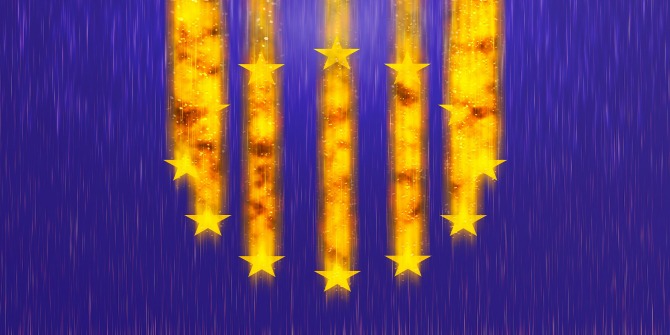 Do we understand enough about what soft power is? Gary Rawnsley explains that although the focus has so far been on cultural icons and stories, there is another important aspect to soft power: the actions of the British government. These are seen as a reflection of the values the UK upholds, and so influence opinions overseas. He argues that understanding this dimension of soft power is becoming more urgent as Brexit approaches.
Do we understand enough about what soft power is? Gary Rawnsley explains that although the focus has so far been on cultural icons and stories, there is another important aspect to soft power: the actions of the British government. These are seen as a reflection of the values the UK upholds, and so influence opinions overseas. He argues that understanding this dimension of soft power is becoming more urgent as Brexit approaches.
So-called “soft power” is now a critical component of UK government discourses on foreign policy. The 2015 Strategic Defence and Security Review recognised Britain’s soft power capacity as a valuable asset while acknowledging the vital role played by instruments of British public and cultural diplomacy such as the BBC World Service, the British Council, and institutions of higher education. Moreover, frequent discussion of “global Britain” at the highest levels of government after the 2016 referendum and the continuation of the “GREAT” campaign demonstrate an enthusiasm for understanding how soft power can help the UK prepare to leave the European Union.
However, if British state and non-state institutions wish to maximise the country’s soft power potential, they must first understand what soft power is and, perhaps most importantly, what it is not; and as yet there is little evidence to demonstrate that they do appreciate what soft power is. The key lies in recognising how governments and other political actors “generate” soft power rather than “exercise” it, because soft power is a resource, not an instrument. It is the end result – the consequence – of policies pursued and relationships maintained that further social progress and generate favourable opinions overseas. Soft power cannot be touched, counted, or used as and when required. Its accumulation and exercise represent long-term processes that should be barely noticeable. It is something that a nation acquires and exercises naturally, not something that can be deliberated and decided by Cabinets and Kings.
Also, the introduction of other unnecessary labels such as “smart power” and most recently “sharp power” simply add to the confusion. As Tom Fletcher, a former Ambassador to Lebanon, noted in his 2016 discussion of Naked Diplomacy, “it matters less whether you call is soft, smart, new or whatever the next catchy moniker is. What matters is that you call it power. And that you get out there and use it”.
The problem is that successive governments, following the British Council’s lead, remain convinced that soft power is synonymous with attraction and familiarity. For example, opinion poll surveys measured the “attractiveness” of the UK among respondents in Europe, the Commonwealth, and the G20 after the 2016 referendum, while the British Council’s 2014 report, As Others See Us, documents what we already know about high levels of awareness among foreign publics of British culture, education, and society.
While the UK has every reason to be proud of its cultural reach, engagement, and heritage, this does not necessarily translate into “power” so that Britain’s foreign policy ambitions will progress. More attention or familiarity does not correlate with more influence. Of course respondents to surveys overseas are familiar with the Monarchy and Shakespeare. They are highly visible, more accessible stories, they are non-threatening, and certainly more “sexy” than complex political ideas, values, institutions, and processes. Yet this is very different from understanding, accepting, or rejecting the values these cultural icons represent. After all, while “to know us” may be “to love us” in some circumstances, in other situations “to know us” may also be “to fear us” or “hate us”.
Rather, I call for greater attention to the behaviour – at home and overseas – of the British government. It is judged less by what it says about itself than what it does and the company it keeps. Soft power lies in the credibility and moral authority of actions taken by state and non-state institutions. This is the reason why we are justified to worry about reports detailing the questionable conduct of some workers in our most prominent overseas aid charities, such as Oxfam, and when the government insists on maintaining a strong relationship with Saudi Arabia despite criticism of that country’s military action in Yemen.
The policy implications of this approach are clear: To generate soft power, the government must behave in an ethical, transparent, and accountable manner; and when it fails to do so, it must correct its mistakes in an equally transparent way. The Chilcot Inquiry and the inquest into the 1989 Hilsborough disaster demonstrate levels of accountability and transparency that communicate a positive narrative about the UK’s democratic values, institutions, and processes. The value of the Chilcot Inquiry lies not in the detail of who said what to whom and when decisions about Iraq were made; rather the value lies in the fact that the inquiry happened. This is the narrative that contributes to the UK’s soft power by communicating a story that not even former Prime Ministers are above scrutiny. The accountability of the police force, a component of the British state’s power, during the Hilsborough inquest likewise communicates a compelling narrative that is absent in many other parts of the world. These are powerful messages about democratic values, democratic institutions, and democratic processes that are often ignored in favour of a more comfortable, glamorous, and easier narratives focusing on British ‘culture’.
For all of the government’s ambitions to create “Global Britain” post-Brexit, the current institutional arrangements – the absence of public diplomacy from core political institutions, the treatment of overseas applicants to Universities, the demonization of migrants and refugees, and misjudged changes to the funding of the BBC World Service and the BBC Monitoring Service – suggest that the UK does not take seriously its soft power capacity or the public diplomacy mechanisms designed to project it. As we approach our exit from the EU and need to turn our attention to more strategic approaches to global influence, the UK government needs to do much more to understand and recognise its soft power and both protect and strengthen the public diplomacy mechanisms designed to communicate it.
Issues about governance as well as the (foreign and domestic) policies the government pursues, affect the UK’s capacity to generate soft power and therefore the quality of its global relationships. It is essential that the government recognise how, since soft power arises from attraction to a country’s values and moral authority, the actions it takes at home and abroad will be seen as a reflection of the values the UK upholds, and will therefore have a profound effect on the UK’s soft power. These issues will only grow more urgent as Brexit approaches.
_______
Note: the above draws on the author’s published work in The Journal of International Communication.
 Gary Rawnsley is Professor of Public Diplomacy in the Department of International Politics at Aberystwyth University.
Gary Rawnsley is Professor of Public Diplomacy in the Department of International Politics at Aberystwyth University.
All articles posted on this blog give the views of the author(s), and not the position of LSE British Politics and Policy, nor of the London School of Economics and Political Science. Featured image credit: Michael Garnett (Flickr/CC BY-NC-SA 2.0).








3 Comments